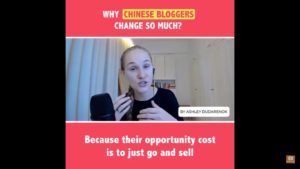
Foreign companies all too often had a simplistic view of China’s consumers. Marketing expert Ashley Dudarenok looks at how she can now differentiate between consumers in different clusters, although she still has to keep it simple, she tells at an interview in Dao Insights.
Dao Insights:
What is the best way to split up the “China market” into consumer groups?
The most important distinction is between north and south China, which have completely different ecosystems when it comes to spending power, culture, and behaviours. This is especially true post-COVID-19, as its economic recovery has been extremely uneven throughout China. Southerners are engaging in “revenge consumption” (a strong desire to buy due to pent up demand); whereas people in the north, especially those residing in tier 2, 3, or 4 cities, are saving due to concerns about job security and commonly have two or three jobs on the side of full-time employment. As such, there is a completely different mental state between the two.
What about the impact of the tier-system on consumer groups?
I use city tiers out of ease, but the term over-simplifies China and its different consumer groups. City tiers were created a long time ago for government planning purposes, not for defining consumer behaviours. Take the example of Changsha: it is building a night economy from scratch by extending work hours, boosting night consumption, and developing cultural streets in order to become China’s number one 24-hour city. So, how do you classify it in the tier system?
Many China-watchers are moving away from these generalisations and focussing on “clusters”. These are groups of 3-5 cities which have similar economies and are a much more accurate way to define consumption patterns.
Ashley Dudarenok is a speaker at the China Speakers Bureau. Do you need her at your (online) meeting or conference? Do get in touch or fill in our speakers’ request form.
Are you looking for more consumer experts at the China Speakers Bureau? Do check out this list.


















